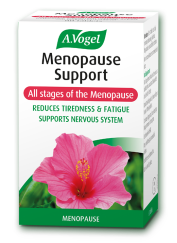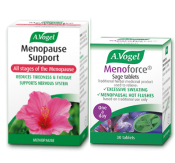Eileen talks about being menopausal
Is it the menopause? - Some signs and symptoms. and questions to consider
You may have heard a lot about perimenopause menopause and the symptoms relating to this stage of life. This is when oestrogen levels (estrogen levels) start to tail off, the ovaries stop releasing eggs, and along the way, most women will experience at least some symptoms.
Menopausal women may be able to resonate with some of the following questions during their menopausal transition:
1 - How old are you?
The average age for entering menopause is 52, but many women start to experience menopause symptoms such as disturbances to their previously regular menstrual cycle in their mid to late 40s, and others don't notice anything until later in their 50s.
Occasionally symptoms happen earlier, say in your 40s, which is known as premature menopause, but this is unusual and it is worth considering other explanations for symptoms experienced at that age.
Family history, or the age your mother experienced menopause symptoms, can often be a helpful guide as to when you might follow suit, as this can often happen around the same age. You may also experience similar, or some of the same symptoms.
2 - Has your cycle changed?
At the start of menopause, many women will notice changing menstrual cycles often characterised by irregular periods; some will notice their menstrual period arrives more often, and sometimes more heavily, than previously. Other women will find their periods coming less frequently or being lighter than before before their periods stop altogether.
Sometimes the cycle becomes erratic, with no pattern emerging. Changes to your cycle including irregular periods at around the age of 50 are likely to be linked to menopause. If you are younger than this then there may be other reasons for changes to menstrual periods, such as thyroid imbalance, nutritional deficiencies (maybe linked to poor digestion or bad diet), or stress, to name a few.
3 - How stressed are you?
Stress is a key factor in messing up hormone balance. Not only can stress cause symptoms that look like premature menopause, but when menopause truly arrives, the stressed woman will have a rougher ride than her calmer sister.
This is because the adrenal glands, which produce adrenalin in response to physical or emotional strain, are also in charge of producing hormones to prop up falling levels of oestrogen and progesterone. If your adrenals are busy coping with stress, they won't have the resources to create these back-up hormones. Your menopause will be more dramatic and harder to handle, so what could have been fairly mild symptoms, could soon develop into more severe symptoms. Stress could also put you at an increased risk of other symptoms apart from menopause, such as mental health symptoms, or even heart disease.
Whilst this might be a scary thought, acknowledging that stress may be an issue for you, can be a really useful step in having a smoother transition through menopause.
4 - Are you having hot flushes and/or night sweats?
A hot flush, otherwise known as a hot flash, or called night sweats if you experience them during the night, are amongst some of the most common symptoms of menopause, and their emergence around the late 40s or early 50s may well herald the start of menopause, especially if these are accompanied by changes in the menstrual cycle. These symptoms combined can certainly signal fluctuating oestrogen levels (estrogen levels).
Hot flashes, or flushes, can often be described as a sudden feeling of heat. This sensation may start in and around the upper parts of the body (such as the chest, neck, or face), or at least rise towards these areas. These hot periods may even be accompanied by opposing cold flashes, as your internal thermostat fluctuates and tries to adjust.
Whilst a large majority of menopausal women experience hot flashes, there can also be other reasons for flushes and sweats though, so consider these before declaring yourself menopausal. Thyroid imbalance; food intolerances; chronic stress; dehydration; side effects of medication; or heart disease/ cardiovascular disease risk factors are just some examples. This isn't an exclusive list either, so always check with a healthcare provider for other possible reasons if you are unsure.
5 - Have you noticed changes in energy levels or body composition, such as weight gain around the middle?
The hormonal changes associated with perimenopause and menopause, more specifically fluctuating levels in the hormones estrogen and progesterone, are perceived as a source of stress for the body. This internal quandary will add to many women's symptoms of menopause, one of which is a change in body composition which may or may not be accompanied by changes in energy levels.
Generally, as women age, they will lose muscle, and the tendency to store more fat around the middle increases. This pattern can also be made worse by increases in stress, or too little protein in the diet. However, it is always going to be helpful to try to be in tune with any signs and symptoms of menopause, so that appropriate diet and lifestyle measures can be put in place.
6 - How many other symptoms do you have?
If you have flushes and/or changes in your menstrual cycle along with several of these other menopause symptoms, then it is more than likely that you are indeed entering menopause and are experiencing hormonal changes: aches and pains; low libido; thinning hair; changes in skin condition; vaginal dryness and/or thinner vaginal tissue(which can cause pain or discomfort during sexual intercourse); urogenital symptoms which can also be connected to pelvic floor muscles changes, including urinary incontinence, changes in bladder control, or an increased frequency in urinary tract infections; disturbed sleep patterns (often due to night sweats); fatigue; low mood, mood changes or other mental health symptoms; emotional fragility e.g. crying for no apparent reason; memory blank spots.
Again, there can be other reasons for many of these symptoms, such as primarily thyroid imbalance and chronic stress, plus this list isn't exhaustive. So, don't always assume that they add up to the menopause, but if you have a number of them, are within the typical age range, and your cycle is awry, then it could be likely.
More details on menopausal symptoms
The average age for experiencing menopause (when you actually have your last menstrual period) is still 52, despite the media focusing on women experiencing earlier menopause.
However, don't be fooled into dismissing your health issues as being part of the perimenopause (the run-up to the menopause), menopause, or even post-menopause (this shouldn't typically last any more than 2 years after your last menstrual period) without very good evidence, because you may miss an important diagnosis of something else – see the alternative possibilities below.
If you experience menopause symptoms that are genuine, this is what they could typically look like:
- Hot flushes
- Night sweats
- Periods becoming lighter and further apart
- Periods becoming heavier and closer together
- Excessive anxiety
- Low mood, mood changes or changes in attitude to your sex life
- Vaginal dryness
- Low libido
- Drier skin, thinner hair, weaker nails
- Arthritic-like joint aches or pains
- Fatigue or a lack of energy
- Memory lapses or trouble concentrating
But, are they definitely menopause?
Many of these, however, can be mistakenly blamed on menopause when actually they are due to stress, wear and tear, and diverse other health issues that should be investigated:
- Hot flushes can be due to food intolerances, stress and nervous system dysfunction, thyroid imbalance, digestive or liver symptoms, or even have links to other health risks such as cardiovascular disease
- Changes in the pattern of your menstrual cycle can be due to stress, thyroid imbalance, deficiencies such as anaemia (a lack of iron) or side effects of birth control (especially if there has been a recent change to your medication or method)
- Excessive anxiety can be due to a lifestyle factors including stress, caffeine intake, nutrient deficiences including low magnesium, or sleep deprivation
- Low libido, a common women's health concern, can be due to stress, sleep deprivation, hormone imbalances separate to menopause (or the lack of a supportive or attractive partner!)
- Cosmetic changes can be due to poor nutrition or hydration (aim to drink at least 1.5l of water daily, before adding any teas (even herbal teas), coffees or other sources of caffeine)
- Fatigue can be due to sleep deprivation, mental or physical loads, nutrient deficiencies or improper digestion
- Joint pains can be due to an active lifestyle, wear and tear, dehydration or inflammation
So, don't rush to a diagnosis of incipient menopause. Check for, or consider other factors first and always consult with qualified healthcare providers if you are in any doubt or require a second opinion.
Many women find that reducing their stress levels, eating a healthier diet, chewing well, drinking sufficient water, exercising lightly but regularly, and prioritising sleep will help to reduce or remove many of the above signs and symptoms - whether in menopause or not!
So if it is the menopause what now?
If you're still unsure if you are menopausal, or what stage of menopause you might be in, a healthcare provider can help confirm this for you.
Then, if you suspect you are going through perimenopause or menopause, it might have been decided between you are your healthcare provider that you are able to try to manage symptoms from home with some natural menopause solutions. In this case, finding the right remedy to help ease your symptoms is important. This can be individual, to some degree, as to which menopause symptoms affect you most, or which other individual dietary, lifestyle or genetic factors may also have a part to play.
Here are some areas and common menopausal symptoms for you to consider:
- Support through all stages of menopause - go to Menopause Support to help manage menopause symptoms. Please note, that Menopause may not be suitable if you were on some form of hormone therapy, such as birth control or the Mirena coil
- Hot flushes – go to Sage
- Night sweats – go to Sage
- Periods becoming lighter and further apart - no action needed as this is the natural course of the menopause (for someone younger not yet expected to be in menopause, get in touch with our Helpline for further advice)
- Periods becoming heavier and closer together – go to Agnus castus and consider some iron support too
- Excessive anxiety or emotional symptoms – go to Stress Relief Daytime, Passiflora Complex, Relaxation Essence
- Low mood or mood changes – go to Hyperiforce®
- Vaginal dryness – consider Ginsavena as one strategy to relieve vaginal dryness, or consider optimising your digestion and utilisation of good fats such as omega-7 sea buckthorn oil. Topical remedies may also be relevant for you
- Low libido – go to Ginsavena
- Drier skin, thinner hair, weaker nails – go to Urticalcin, Hair Complex, Comfrey Cream
- Arthritic-like joint pains – go to Devil's Claw
- Fatigue – go to Ginsavena
- Memory lapses – go to Ginkgo biloba
- Sleep disturbances - go to Dormeasan®
Please note, for any persistent or severe symptoms, always seek medical advice from a qualified healthcare provider. Also, these lists of menopause symptoms are not exhaustive and you may also experience other menopause symptoms.
For postmenopausal women who are still experiencing hot flashes or other symptoms of menopause, please do get in touch with our helpline for more information.
First published on 20/7/12, updated on 27/02/24









